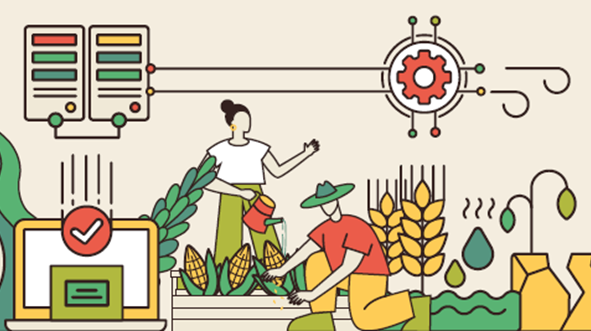 Read this article in French
Read this article in French- Share this article
- Subscribe to our newsletter
CRISP: The new interactive tool for climate risk planning & management
The central role of sustainable agri-food systems is becoming increasingly apparent in global efforts to tackle climate change. Both the 26th Conference of the Parties (CoP) to the UN Framework Convention on Climate Change (UNFCCC) and the 6th Intergovernmental Panel on Climate Change (IPCC) assessment report acknowledge the critical need to shift towards climate-resilient, nature-positive land use patterns and agri-food systems. Such a shift would also help curb land degradation and enhance biodiversity, thereby contributing to various sustainable development goals and multilateral environmental agreements.
Within this context, agricultural development programmes are increasingly seeking to mainstream climate action into their portfolios. Thoroughly considering context-specific climate risks and adaptation options for both agricultural production systems and local communities may pose a huge challenge however, given that project planners and managers often do not possess the relevant expertise or capacities, and sound climate risk analyses are often not budgeted for.
Why a new tool?
To date, there is no easily accessible climate-risk tool that considers the specific characteristics of agri-food systems. Available tools are typically neither sector-specific nor freely available; they are often time-consuming or complex to use, and typically demand extensive stakeholder engagement.
The climate risk planning & managing tool for development programmes in agri-food systems (CRISP) will be a freely available, quick- and simple-to-use, interactive web-based tool for agricultural and rural development project planners and managers across diverse institutions.
CRISP will help strengthen mainstreaming climate adaptation into project design, planning and implementation. It will support the systematic analysis of climate hazards, the exposure of people and agricultural systems to climate risks, their vulnerabilities and adaptive capacities. The tool will highlight entry points for climate risk management for different types of projects, propose adaptation hypotheses, point towards adaptation options and link to additional knowledge sources. Moreover, the tool will assist in aligning projects with national development priorities articulated in Nationally Determined Contributions (NDCs) and National Adaptation Plans (NAPs).
The motivator
Considering the above-mentioned challenges, mainstreaming climate action into development projects in the agri-food space is not an easy task – especially if there are only few resources to conduct a comprehensive climate-risk analysis and to navigate the rapidly expanding knowledge base on climate change. Eurac Research and The Alliance of Bioversity International and CIAT (International Centre for Tropical Agriculture) will lead the development of CRISP in collaboration with the Deutsche Gesellschaft für internationale Zusammenarbeit (GIZ) and other stakeholders interested in joining the co-design process.
The co-design process
The CRISP tool is being developed in a co-design process with the active participation of interested project staff, ensuring input and validation from target users.
So far, multiple stakeholders from research and implementation have engaged in interactive situational analyses organised by the project team in order to capture experiences with climate risk analyses and potential user needs within the context of agri-food systems and beyond. Engagement until now has indicated that CRISP could not be any more timely, given the great demand for rapid climate risk analyses within agri-food systems to support climate-risk mainstreaming efforts.
Contact
The CRISP project team views close collaboration with a wide range of actors in the agricultural and rural development sphere as key to the successful development and best possible use of the tool. We invite project designers, implementers, and any other interested stakeholders to actively participate in our co-design process.
To get involved in tool development or testing, please contact Friederike Mikulcak (friederike.mikulcak@giz.de) or Wiebke Foerch (wiebke.foerch@giz.de) of the GIZ Sector Project Rural Development.
Authors: Friederike Mikulcak and Dr. Wiebke Foerch, Deutsche Gesellschaft für Internationale Zusammenarbeit (GIZ) GmbH, Bonn/Eschborn, Germany





Add a comment
Be the First to Comment